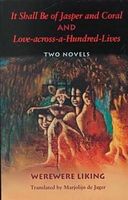- Welcome to FictionDB, Guest
- | My Account
- | Help

It Shall Be of Jasper and Coral and Love-Across-A-Hundred-Lives — Werewere Liking

The West African writer, painter, playwright, and director Werewere Liking is considered one of the best literary interpreters of the postcolonial condition in Africa. Her first work to be translated into English, these two novels spare nothing in their satirical portraits of the patriarchal view of African society as they experiment radically with the novel form.
At once dramatic, lyrical, satirical, and epistolary, "It Shall Be of Jasper and Coral (Journal of a Misovire)," subtitled "A Song-Novel," introduces the "misovire"―literally defined as a man-hater but seen by Liking as the figure of a time when gender differentiation will be irrelevant to discovering the fullness of what it means to be human. The misovire recounts the story of the inhabitants of Lunaï, a squalid fictional village in Africa. The novel's action occurs on two levels, as the misovire contemplates writing a journal, and through that heralds the creation of a new race.
Instead of holding the daily entries of a conventional diary, this journal is to be composed of nine "pages," each dedicated to a specific theme, from creativity and art criticism to friendship and the importance of raising children to be balanced human beings. The misovire's musings, interspersed with the dialogue of two comical characters named Babou and Grozi, bring together a powerful polyphony of modern Africa. While bitterly critical, it ends on a hopeful note, as the misovire prophesies the birth from the sea of a new African who "shall be made of jasper and coral."
In "Love-across-a-Hundred-Lives," the narrator tells the story of Lem, her brother, who is preparing to hang himself when his grandmother Madjo appears. He secretly expects her to dissuade him from suicide, but instead she encourages him, urging him to make his final action a success that will make up for all his earlier failures. As he continues to knot the rope that will be his noose, Madjo tells Lem stories of their ancestors, of legendary and historical African figures; interwoven are the voices of Lem himself, of the narrator, and of her sister Go. When Lem is finally ready to conclude his act, he no longer wants to die. Madjo has accomplished her mission to make Lem a man in the most complete and most noble sense of the word, whole and strong enough not only to survive but to give of himself to others.
In addition to illustrating the formal innovations for which Liking is increasingly known and celebrated in Africa and the francophone world, these two novels establish a discourse with icons of African literature such as Léopold Sédar Senghor and Cheikh H. Kane, debunking many myths about the continent that produced them. With Liking's refreshingly iconoclastic writing driving their message, "It Shall Be of Jasper and Coral" and "Love-across-a-Hundred-Lives" introduces a fascinating African literary voice to the English-speaking world.

